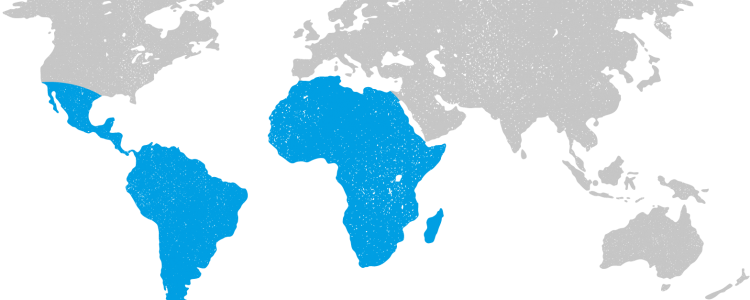Yellow fever (YF) is a vaccine preventable viral disease. 90% of all yellow fever cases are found on the African continent and is most prevalent in the western part of sub-Saharan Africa such as Nigeria, Ghana, Sierra Leone, Senegal, and Mali. Yellow fever is also present in South America and parts of Central America and is endemic in Brazil, Bolivia, Colombia, Ecuador, Venezuela, and Peru. Studies show that it affects over 200,000 people each year with over 78,000 deaths however factors such as underreporting, poor surveillance and misdiagnosis means that it is very difficult to report the true burden of this disease.
Transmission of Yellow Fever
Yellow fever is a virus that circulates between infected monkeys or humans and mosquitoes. The virus is transmitted by the daytime biting Aedes aegypti mosquito which also spreads viruses such as Dengue, Chikungunya, and Zika virus. This mosquito is found in many tropical and subtropical regions around the world.
At present Yellow fever is only present in two continents globally but other countries such as those in Asia are very vulnerable to the potential introduction of the disease by means of international travel. This makes them particularly vigilant in ensuring that YF is not introduced into their country. To prevent the international spread of disease, an International Certificate of Vaccination or Prophylaxis (ICVP) is issued to everyone who receives the Yellow fever vaccine. If the traveller has very recently visited a country with YF risk and enters a country with no YF risk, then proof of this certificate is required to enter the country. Without a certificate the traveller is at risk of being detained at immigration and potentially being vaccinated before being allowed to enter the country or placed in quarantine for 10 days.
Risk for Travellers
Ongoing cases and outbreaks of Yellow Fever continue to occur in Africa and South America; however, the disease is preventable by vaccination and is a very rare cause of illness in travellers. In the past 9 yrs there have been a number of reported deaths In European travellers who had visited YF risk regions. It is important to note that none of them had been vaccinated against YF.
Initial symptoms of yellow fever infection can include fever, severe headaches, body aches, nausea, vomiting, fatigue and weakness. This can lead to jaundice, bleeding and organ failure.
Vaccination and Mosquito Bite Prevention
If visiting a country or region with a risk of Yellow fever it is important that the YF vaccination is considered. Risk of the disease in country has to be weighed up against the risk of potential side effects from the vaccination. Areas within the country visited should be considered as not all areas may have the risk of YF. Other factors such as length of stay and age may also determine whether the YF vaccination is recommended.
For some travellers the risk may be determined so low that only mosquito bite prevention is advised.
All travellers visiting risk countries for Yellow fever should practice and adhere to mosquito bite avoidance measures by applying 50% DEET insect repellent to exposed skin, wearing long loose clothing and applying permethrin to clothes and nets where required.
The Yellow Fever Vaccine – Stamaril
The Yellow fever vaccine is a live vaccine that has been used for over 80 years and has shown to be highly effective in providing immunity against the YF disease. For healthy individuals over 2 years of age the vaccine provides lifetime protection. For a small number of travellers booster doses may be required, for example young children from the age of 9 months to 2 years.
Some people may experience some side effects after receiving the vaccine, These are often mild and include headache, muscle pain, raised temperature and soreness at the injection site. It is extremely rare for individuals to experience serious reactions; however, these risks do increase for those over 60 years of age.
It is important to note that some medical conditions including those that cause immunosuppression will indicate that the vaccine is not safe for some individuals and cannot be given as it would be harmful and unsafe. It is always important to declare all medical conditions when attending a Yellow fever risk assessment and consider a travel risk assessment prior to booking your holiday.
Getting Vaccinated
All our travel health clinics across the country are official Yellow fever registered vaccination centres. Our specialist Travel health clinicians will undertake a thorough travel health risk assessment and medical history to ensure that the vaccine is suitable and safe for you to receive. It is really important to ensure that you allow enough time prior to your departure date to make an appointment for this vaccine as it does take 10 days for the vaccine to be effective and for the IVCP to be accepted by country border officials. Please note sometimes a further appointment may be required before the vaccine can be administered.
When you receive a ICVP It is very important to keep it safe , travel with it and hold copies as the certificate can be re issued if lost.
Ensure you’re informed and protected by consulting with our travel health experts before you travel. Book your yellow fever vaccination with a Nomad travel clinic today.
Further Reading
From Travel Health Pro About Yellow Fever and Yellow Fever PDF

